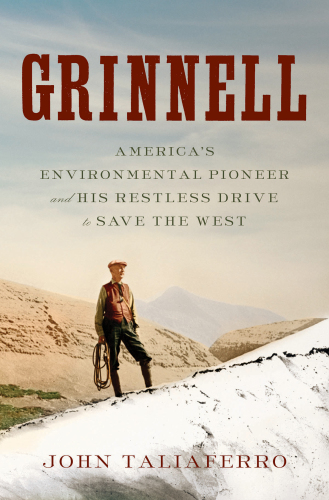
Grinnell
America's Environmental Pioneer and His Restless Drive to Save the West
کتاب های مرتبط
- اطلاعات
- نقد و بررسی
- دیدگاه کاربران
نقد و بررسی

Starred review from February 18, 2019
Taliaferro (Great White Fathers), a former senior editor at Newsweek, delivers an impressive, eminently readable biography of the great conservationist George Bird Grinnell (1849–1938). In rendering a life that was “a study in romanticism, evolution, and progressivism,” Taliaferro meticulously draws from 40,000 pages of correspondence, about 50 diaries and notebooks covering Grinnell’s travels, 35 years of articles and editorials from his magazine, Forest and Stream, and Grinnell’s many books, including the history The Fighting Cheyennes, seven novels for boys, and an unfinished autobiography. Grinnell lived on the East Coast, in New York State and Connecticut, but he lived for the West. In addition to bestowing his name, “in a rare breach of modesty,” on a glacier and a lake in Montana, Grinnell formed the Audubon Society, cofounded the Boone and Crockett Club with Theodore Roosevelt, and “midwifed” Glacier National Park, while helping protect Yosemite and Yellowstone from developers. He just missed being among the dead at Little Big Horn, yet listened intently to Native Americans throughout his life and lobbied for them in Washington, D.C. Anyone who’s ever set foot in a national park and wondered how it came to be will find an important part of the answer in this expansive look at an equally expansive life.

March 15, 2019
A biography of a 19th-century naturalist who worked tirelessly on behalf of America's wilderness and Native American rights.Beginning in 1870, with his first trip west, George Bird Grinnell (1849-1938) evolved into one of the most prominent conservationists in America, a friend of Theodore Roosevelt, John Muir, and many native tribal leaders. He campaigned to establish national parks, the Audubon Society, and the New York Zoological Society; edited the long-running journal Forest and Stream; founded the Boone and Crockett Club, whose mission it was to preserve large game; and published many ethnographies of Plains tribes. Drawing on 40,000 pages of correspondence, 50 diaries and notebooks, and an unfinished autobiography, Taliaferro (All the Great Prizes: The Life of John Hay, from Lincoln to Roosevelt, 2013, etc.) thoroughly--and with due admiration--documents the life of "a man of worthy causes." He acknowledges, however, the limitations of his sources: "Possibly Grinnell was simply too busy and proper to indulge in self-reflection. Or was there something he wanted to avoid reflecting upon?" Although the author hints at "secrets," he reveals little about Grinnell's intimate relationships with friends and family, including his wife, whom he suddenly married in 1902. A photographer, she energetically accompanied him on his trips west, where he exulted in freedom from the commercial world of New York and experienced the "magnificent drama" of events such as the Pawnee buffalo hunt: "the most momentous, the most defining experience" of Grinnell's life. "There is something rather horrible in the wild and savage excitement that one feels under such circumstances," he said of another hunt. Taliaferro portrays Grinnell evenhandedly as a man of his time: Seeing the oppression suffered by Native Americans, Grinnell urged recognition that they "are humans like ourselves"; still, he "hewed to the prevailing anthropological wisdom that Indians were only midway up the ladder from savagery to civilization." Grinnell's life, Taliaferro aptly concludes, "was a study in romanticism, evolution, and progressivism."A fine biography of a significant environmental champion.
COPYRIGHT(2019) Kirkus Reviews, ALL RIGHTS RESERVED.

May 1, 2019
Brooklyn-born George Bird Grinnell (1849-1938) was an ethnographer, explorer, entrepreneur, and editor of Forest and Stream magazine, along with being a naturalist and, for a short time, a rancher. Taliaferro (All the Great Prizes) explains Grinnell's early influences, including teacher "Minnie" Audubon (widow of John James) and George Armstrong Custer. As a naturalist, Grinnell made several trips west, with Montana a favorite destination. His many involvements and successes in conservation include founding the first national Audubon Club, partnering with Theodore Roosevelt to create the Boone and Crockett Club, rallying support for protection of Yellowstone's wildlife, and advocating for the creation of Glacier National Park. Taliaferro masterfully attends to the long, busy arc of his subject's life, scouring some 40,000 pages of Grinnell's letters, numerous diaries, and travelogs, years of Forest and Stream articles, plus his monographs to create a satisfying portrait. The reader's reward is a sense of nature, native culture, and landscapes as viewed through an observant explorer's eyes, at the moment when Westward expansion was irrevocably changing it. VERDICT This richly detailed biography will engage students of environmental history and general readers alike.--Robert Eagan, Windsor P.L., Ont.
Copyright 2019 Library Journal, LLC Used with permission.

June 1, 2019
Although his fame was later eclipsed by that of such naturalists as John Muir and Aldo Leopold, Brooklyn native George Bird Grinnell (1849-1938) had a tremendous influence on conservation in his time, almost single-handedly rescuing the American buffalo from extinction and protecting Yosemite and Yellowstone from meddlesome poachers and developers. Taliaferro (All the Great Prizes, 2013) proves equal to the challenge of singing Grinnell's long overdue praises in this sweeping account of his life and many lasting accomplishments. Although Grinnell barely completed his degree at Yale in 1870, a stray opportunity to go bone hunting with one of his palaeontology professors ignited a lifelong passion for wilderness pursuits, which led to his editing Forest and Stream magazine and spending time with Plains Indian tribes. Grinnell also played a huge role in establishing Glacier National Park, where a glacier bears his name. Taliaferro's work has all the earmarks of a first-rate biography: colorful anecdotes, cameos of the many famous people Grinnell rubbed elbows with, and absorbing prose that will inspire reader admiration for this often overlooked but important environmental hero.(Reprinted with permission of Booklist, copyright 2019, American Library Association.)

























دیدگاه کاربران